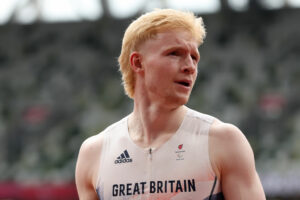Nik Diaper makes EIS return as Head of Paralympic Performance Support
Nik Diaper is returning to the English Institute of Sport (EIS) as our new Head of Paralympic Performance Support, after three successful years as Head of Para Sport at Loughborough University. Here, Nik reflects on his time at Loughborough and outlines what he hopes to achieve in his new role.
While Nik Diaper’s appointment as Head of Paralympic Performance Support at the EIS does “feel a little bit like coming home”, after he spent 13 years with the organisation earlier in his career, he is very much aware that a lot has changed in his time away.
First of all, he has changed. Since leaving the EIS, Diaper has worked at the British Paralympic Association (BPA) as Head of Performance, before taking on the role of Head of Para Sport at Loughborough University in June 2019.
And despite his time there being affected by the Covid-19 pandemic, Diaper believes he leaves the role in a “really strong position”, having established the first ever Para Sport strategy for the university, covering both participation and elite level sport.
Diaper said: “Considering how much impact Covid-19 has had on everybody, when I look at what we’ve achieved in Para Sport at Loughborough, it’s probably one of the things I’m most proud about in my career.
“It was effectively a blank sheet of paper when I came in – that’s what excited me about the role, and knowing the potential that Loughborough always had to do something really amazing in Para Sport, working in partnerships with the likes of the EIS or national governing bodies of sports.
“In both recreational, social sport and elite para sport, I think we’ve got some incredible momentum, and I’d like to think that I’m leaving my Loughborough role in a really good position, to ensure there’s a legacy left behind for someone else and for the university to move it forward.”
In terms of highlights, Diaper pointed to the success of the Loughborough Lightning Wheelchair Basketball squad, who won the inaugural Women’s Premier League title in May 2022, having gone undefeated throughout the season.
Loughborough para athletes have also competed at the highest level – the Paralympic and Commonwealth Games, and World and European Championships – but, for Diaper, it’s not all about the results.
“Results are great because they give you great stories to tell, and something like Lightning Wheelchair Basketball is a very visible, tangible story that people can come and watch,” he explained.
“But for me, it’s always been about the power of para sport to change the way people think and talk about disability. So when I look at the fans who came to watch our wheelchair basketball games, for many of them it’s the first time they’ve ever watched [para sport], and the overwhelming response is one that’s positive and eye-opening.
“You can really see how it changes the way people think. Then I think that it’s a vehicle to inspire change, whether it’s infrastructure or challenging the way buildings are designed, to make them more accessible and inclusive.
“It’s always been about a wider desire to use para sport to change the way people think about disability, and about creating life-shaping opportunities for students with a disability to engage with sport. And I think we’ve made big strides towards that, but there’s still a long way to go.”

In terms of what he brings in to his new EIS role, Diaper said: “I’ve grown as a leader. I’ve had leadership roles across my career, but leadership is never an end point, it’s a continuous journey.
“So what I’m excited to bring to the EIS is what I’ve learned from myself as a leader and, in particular, how you work with external partners and external agencies. It’s not necessarily something that I’ve learned new at Loughborough, but it’s reinforced what I’ve always known, that the whole system is very intricately connected, whether it’s elite sport or recreational social sport.
“The value of working in partnership can never be underestimated and for the EIS, with 19 Paralympic programmes who get some service level provision from the EIS, that is a huge number of external stakeholders.
“Partnership working with them, as well as with UK Sport and the British Paralympic Association, is the name of the game for me. When we go to a Paralympic Games, it’s Great Britain, it’s not one sport – it’s a whole nation coming together.”
Diaper is a different man to the one who left the EIS, and the EIS is a different organisation now. So while it is something of a homecoming for him, Diaper is not under the illusion that he knows the EIS inside out.
“I’m so excited to come back to the EIS,” he said. “I think it’s been probably five or six years that I’ve been away, and I’m well aware that the EIS has changed significantly in that time.
“I’ve changed as an individual, too, so although it does feel a little bit like I’m coming home, it feels like I’m coming into something very new, something different. The people are different. There are still some people that are the same, but by and large it feels different.
“I look back at the 13 years that I spent with the EIS initially, and I absolutely loved working there. I left with an open mind to think that, if the right opportunity came up, I would never hesitate to come back.
“If anything, I think spending time outside of the EIS, what I’ve learned in that time, even just viewing the EIS through a different lens as a partner rather than working for them, is invaluable because I think the risk in places like the EIS or any organisation is institutionalised thinking.
“If nobody ever leaves and no new people ever come in, then you get that institutionalised thinking, and I’d like to think I can come in with a very fresh perspective on the system, though I wouldn’t ever dare assume that I know all there is to know about the EIS.”
Diaper started his EIS journey as a Sports Science Intern in 2004, going on to hold a number of EIS Paralympic sport roles, including Head of Sports Science and Sports Medicine for Paralympic Sport, in which he led the development of the EIS Paralympic Sport Strategy.
In doing that, Diaper believes he helped the EIS “become more comfortable and more confident in its ability to provide the amazing support that it does to Paralympic athletes and programmes”.
And now, returning as Head of Paralympic Performance Support, he is “excited to see how that’s evolved, and how we take it to the next level”.
As well as a vision for taking Paralympic sport to the next level, and within that using it as a vehicle to change people’s views on disability more widely, Diaper is very much aware that the Paris Games are just two years away – and so that has to be his immediate priority.
“Paris is going to be here before we know it,” he said. “So for me it’s really about taking my time to understand where I can add value to individuals or the system in the build-up to Paris.
“You know it’s not the time to start changing the system and the structures. So I think it’s really ensuring that support for sports is targeted in in the right areas and linked up with performance planning and the What It Takes To Win models.
“I’ll be working with partners like the British Paralympic Association and UK Sport to make sure that the system is aligned and focusing on the right areas in the two years up to Paris. Then, once we get beyond Paris and start to look towards Milano Cortina [2026] and Los Angeles [2028], we can start to be a bit more bold, in maybe a new direction of how things can be delivered.”

And how would he measure success?
“It’s hard not to go straight towards performance at the Paralympic Games, because I think the nature of working in elite sport is that, whether we like it or not, success is measured by how successful the team is at the Games.
“But I think that can still be broken down into more than just medals – how many athletes achieve lifetime bests or their best performances, or how many can win medals across more sports than we did in Tokyo, or new athletes coming through and delivering performances.
“Then, from an EIS perspective, [success] is when sports recognise that they couldn’t have delivered their success without the support of an organisation like the EIS, whether it’s athletes or coaches or the programmes themselves that acknowledge that they couldn’t have achieved without certain practitioners or certain projects that the EIS helped deliver or worked in partnership with UK Sport or the BPA on.
“We don’t do it for the recognition, but sports vote with their resources I guess, and continued investment to work in partnership with the EIS. I think for me that’s what success would look like – a strong performance at the Games, and also the recognition that the EIS would hopefully get.”